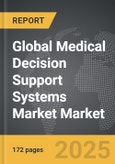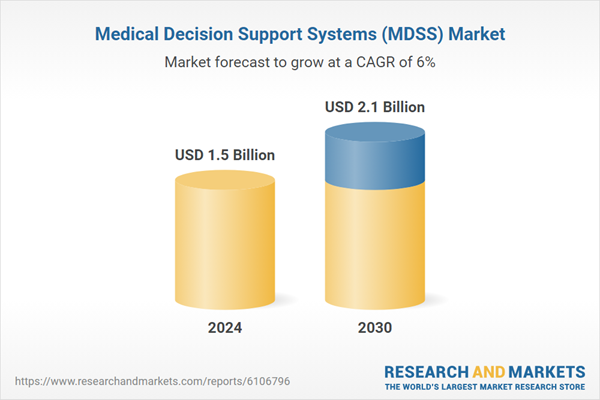Global Medical Decision Support Systems (MDSS) Market - Key Trends & Drivers Summarized
How Are Medical Decision Support Systems Transforming Clinical Decision-Making in Healthcare?
Medical Decision Support Systems (MDSS) are fundamentally reshaping how healthcare providers approach diagnosis, treatment planning, and patient management by offering real-time, data-driven insights at the point of care. These systems analyze vast amounts of patient data, clinical guidelines, and research findings to support clinicians in making more accurate and timely decisions. MDSS solutions can be integrated into electronic health records, enabling automated alerts, risk stratification, and personalized treatment recommendations based on patient history and clinical indicators. This capability is particularly valuable in environments where time-sensitive decisions are critical, such as emergency departments, intensive care units, and oncology wards. MDSS tools also help identify potential drug interactions, flag abnormal lab results, and ensure adherence to evidence-based guidelines. By reducing human error and cognitive overload, these systems enhance the quality and consistency of care while supporting a more standardized approach to clinical practices. They also empower less experienced clinicians with advanced decision-making support, helping to bridge gaps in expertise and improve outcomes in under-resourced settings. Furthermore, MDSS can analyze historical data to predict complications or disease progression, allowing for preventive interventions and personalized care plans. As healthcare systems grow more complex and patient expectations rise, MDSS solutions are playing a pivotal role in enabling smarter, more efficient, and outcome-focused care delivery across a wide range of specialties.How Are Emerging Technologies Enhancing the Capabilities of MDSS Platforms?
The capabilities of Medical Decision Support Systems are being significantly enhanced by emerging technologies such as artificial intelligence, machine learning, natural language processing, and big data analytics. These technologies allow MDSS platforms to move beyond rule-based decision trees and adopt more adaptive, predictive, and context-aware models that can learn and evolve over time. Machine learning algorithms can detect subtle patterns in complex datasets that might be missed by human clinicians, providing early warnings for conditions such as sepsis, cardiac events, or adverse drug reactions. Natural language processing enables systems to extract relevant information from unstructured clinical notes, imaging reports, and academic literature, enriching the knowledge base that supports decision-making. Cloud computing is making MDSS more scalable and accessible by allowing real-time data processing and storage across multiple institutions, fostering collaboration and data sharing. Voice recognition and mobile integration are improving the usability of MDSS tools, enabling clinicians to access and interact with decision support functions on the go or during patient consultations. These technological advancements are not only increasing the accuracy and utility of MDSS platforms but are also helping them adapt to different clinical workflows and specialties. The ability to update in real-time based on the latest guidelines or population health trends ensures that these systems remain current and clinically relevant. As the healthcare industry continues to embrace digital transformation, the integration of these technologies into MDSS is redefining how medical knowledge is applied at the bedside, driving both innovation and improved patient outcomes.How Are Clinical Adoption and Workflow Integration Influencing the MDSS Market?
The widespread clinical adoption and seamless workflow integration of Medical Decision Support Systems are critical factors influencing their success and market growth. Healthcare providers are increasingly recognizing the value of MDSS tools in enhancing diagnostic accuracy, reducing unnecessary testing, and improving treatment consistency across different patient populations. However, the true impact of these systems depends heavily on how well they integrate into existing clinical workflows without disrupting practitioner efficiency. To ensure widespread acceptance, MDSS platforms are being designed with intuitive interfaces, customizable alert thresholds, and interoperability with hospital information systems, laboratory databases, and imaging software. When properly implemented, these systems can streamline clinician tasks by automating routine functions, reducing documentation time, and offering actionable insights that are easy to interpret and apply. Additionally, MDSS solutions are being tailored to the specific needs of various departments, from primary care and radiology to intensive care and mental health services. Feedback loops that allow clinicians to contribute to system refinement are improving trust and long-term usage. Training programs and change management initiatives are also crucial for ensuring that healthcare teams understand the capabilities and limitations of MDSS and can use them effectively as part of a broader care strategy. As more hospitals and clinics move toward value-based care models, MDSS platforms are increasingly seen as essential tools for improving care quality while controlling costs. The push toward interoperability and standardized data sharing is further enhancing the role of MDSS in creating a more connected, efficient, and patient-centered healthcare ecosystem.What Factors Are Driving the Expansion of the Global MDSS Market?
The growth in the Medical Decision Support Systems market is being driven by a convergence of healthcare, technological, and policy factors that reflect global efforts to improve clinical decision-making and patient safety. First, the rising prevalence of chronic diseases, aging populations, and healthcare workforce shortages are putting pressure on health systems to adopt tools that improve diagnostic efficiency and resource allocation. Second, the rapid digitization of healthcare records and the expansion of health information exchanges are providing the necessary data infrastructure to support MDSS implementation on a broad scale. Third, advances in artificial intelligence and data analytics are enabling the development of highly sophisticated, predictive decision support tools that can address a wide range of clinical scenarios. Fourth, the global emphasis on evidence-based medicine and clinical standardization is encouraging the use of MDSS to ensure guideline adherence and reduce variability in care. Fifth, increasing regulatory support and investment in health IT by governments and private stakeholders are facilitating the integration of MDSS into national health strategies. Sixth, the growing emphasis on precision medicine is creating demand for systems that can tailor recommendations to individual patient profiles based on genetic, lifestyle, and clinical data. Seventh, the shift toward value-based care and outcome-based reimbursement models is motivating providers to adopt decision support tools that improve quality metrics and reduce preventable complications. Lastly, the COVID-19 pandemic underscored the need for scalable, real-time decision support in managing public health crises, further validating the importance of MDSS in future healthcare preparedness. These drivers collectively position MDSS as a transformative force in global healthcare delivery.Report Scope
The report analyzes the Medical Decision Support Systems (MDSS) market, presented in terms of market value (US$). The analysis covers the key segments and geographic regions outlined below:- Segments: Product Type (Knowledge-based MDSS, Non Knowledge-based MDSS).
- Geographic Regions/Countries: World; United States; Canada; Japan; China; Europe (France; Germany; Italy; United Kingdom; Spain; Russia; and Rest of Europe); Asia-Pacific (Australia; India; South Korea; and Rest of Asia-Pacific); Latin America (Argentina; Brazil; Mexico; and Rest of Latin America); Middle East (Iran; Israel; Saudi Arabia; United Arab Emirates; and Rest of Middle East); and Africa.
Key Insights:
- Market Growth: Understand the significant growth trajectory of the Knowledge-based MDSS segment, which is expected to reach US$1.4 Billion by 2030 with a CAGR of a 5%. The Non Knowledge-based MDSS segment is also set to grow at 8.1% CAGR over the analysis period.
- Regional Analysis: Gain insights into the U.S. market, valued at $396.2 Million in 2024, and China, forecasted to grow at an impressive 9.2% CAGR to reach $415 Million by 2030. Discover growth trends in other key regions, including Japan, Canada, Germany, and the Asia-Pacific.
Why You Should Buy This Report:
- Detailed Market Analysis: Access a thorough analysis of the Global Medical Decision Support Systems (MDSS) Market, covering all major geographic regions and market segments.
- Competitive Insights: Get an overview of the competitive landscape, including the market presence of major players across different geographies.
- Future Trends and Drivers: Understand the key trends and drivers shaping the future of the Global Medical Decision Support Systems (MDSS) Market.
- Actionable Insights: Benefit from actionable insights that can help you identify new revenue opportunities and make strategic business decisions.
Key Questions Answered:
- How is the Global Medical Decision Support Systems (MDSS) Market expected to evolve by 2030?
- What are the main drivers and restraints affecting the market?
- Which market segments will grow the most over the forecast period?
- How will market shares for different regions and segments change by 2030?
- Who are the leading players in the market, and what are their prospects?
Report Features:
- Comprehensive Market Data: Independent analysis of annual sales and market forecasts in US$ Million from 2024 to 2030.
- In-Depth Regional Analysis: Detailed insights into key markets, including the U.S., China, Japan, Canada, Europe, Asia-Pacific, Latin America, Middle East, and Africa.
- Company Profiles: Coverage of players such as Air Techniques International, AlphaSense Inc., Becton, Dickinson and Company (BD), Bertin Technologies, bioMérieux SA and more.
- Complimentary Updates: Receive free report updates for one year to keep you informed of the latest market developments.
Some of the 34 companies featured in this Medical Decision Support Systems (MDSS) market report include:
- Allscripts Healthcare Solutions
- Babylon Health
- Cerner Corporation (Oracle Health)
- Change Healthcare (Optum/UnitedHealth)
- Clinical Decision Support LLC
- Elsevier Clinical Solutions
- Epic Systems Corporation
- First Databank, Inc. (FDB)
- GE HealthCare Technologies Inc.
- IBM Watson Health (now Merative)
- Infermedica
- Isabel Healthcare
- Koninklijke Philips N.V.
- Meditech
- Medwhat
- Oracle Corporation (Oracle Health)
- Siemens Healthineers
- Tempus Labs, Inc.
- Wolters Kluwer Health
- Zebra Medical Vision
This edition integrates the latest global trade and economic shifts into comprehensive market analysis. Key updates include:
- Tariff and Trade Impact: Insights into global tariff negotiations across 180+ countries, with analysis of supply chain turbulence, sourcing disruptions, and geographic realignment. Special focus on 2025 as a pivotal year for trade tensions, including updated perspectives on the Trump-era tariffs.
- Adjusted Forecasts and Analytics: Revised global and regional market forecasts through 2030, incorporating tariff effects, economic uncertainty, and structural changes in globalization. Includes historical analysis from 2015 to 2023.
- Strategic Market Dynamics: Evaluation of revised market prospects, regional outlooks, and key economic indicators such as population and urbanization trends.
- Innovation & Technology Trends: Latest developments in product and process innovation, emerging technologies, and key industry drivers shaping the competitive landscape.
- Competitive Intelligence: Updated global market share estimates for 2025, competitive positioning of major players (Strong/Active/Niche/Trivial), and refined focus on leading global brands and core players.
- Expert Insight & Commentary: Strategic analysis from economists, trade experts, and domain specialists to contextualize market shifts and identify emerging opportunities.
Table of Contents
Companies Mentioned (Partial List)
A selection of companies mentioned in this report includes, but is not limited to:
- Allscripts Healthcare Solutions
- Babylon Health
- Cerner Corporation (Oracle Health)
- Change Healthcare (Optum/UnitedHealth)
- Clinical Decision Support LLC
- Elsevier Clinical Solutions
- Epic Systems Corporation
- First Databank, Inc. (FDB)
- GE HealthCare Technologies Inc.
- IBM Watson Health (now Merative)
- Infermedica
- Isabel Healthcare
- Koninklijke Philips N.V.
- Meditech
- Medwhat
- Oracle Corporation (Oracle Health)
- Siemens Healthineers
- Tempus Labs, Inc.
- Wolters Kluwer Health
- Zebra Medical Vision
Table Information
| Report Attribute | Details |
|---|---|
| No. of Pages | 172 |
| Published | January 2026 |
| Forecast Period | 2024 - 2030 |
| Estimated Market Value ( USD | $ 1.5 Billion |
| Forecasted Market Value ( USD | $ 2.1 Billion |
| Compound Annual Growth Rate | 6.0% |
| Regions Covered | Global |









